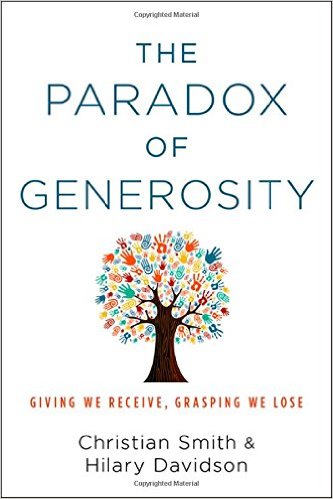Book Review: The Paradox of Generosity: Giving We Receive, Grasping We Lose

C. Smith, H. Davidson (2014). The paradox of generosity: Giving we receive, grasping we lose. New York, NY: Oxford University Press. 261 pp., US$ 29.95 (hardcover).
Jim Alexander of Indiana University–Purdue University recently took the time to review the book in the December 2015 issue of Nonprofit and Voluntary Sector Quarterly. From the review:
Smith and Davidson carefully walk the reader through empirical research which confirms that lives of well-being cause the practice of generosity and that generous practices cause an improved quality of life in those who consistently give of themselves. Despite the causal loop between one’s quality of life and the generous acts they perform, the authors find that most Americans choose not to consistently practice generosity, opting for the supposed comfort of cultural individualism. Indeed, most Americans do
not routinely give money, volunteer for causes of which they are passionate about, or regularly practice acts of neighborly generosity.
To investigate this trend, the authors move from impressive survey data into detailed qualitative interviews of ungenerous individuals. Far from uncompassionate, ungenerous Americans, across economic backgrounds, displayed lives of existential anxiety and clung to notions of self-preservation in the face of the unexpected. Coupled with the pressures of individualism, ungenerous Americans routinely understood practices of generosity as a low priority. Alternatively, Smith and Davidson found that generous individuals experience less existential anxiety and preoccupation with self-preservation because they tend to view their lives as full of abundance without an overriding need to seek more from the world.
You can read the full review from Nonprofit and Voluntary Sector Quarterly by clicking here. Like what you read? Click here to sign up for e-alerts and have all the research and reviews like this sent directly to your inbox!


























































































Cynthia,
For some reason, I’m unable to access the full review through this message (although I can do so through my library connection). ‘thought I should let you know in case there’s some kind of systemic problem. It may just be me!
We missed you in Seattle. I do enjoy your blog—lots of good references for my current research.
Happy new year!
Debby Andrews
Hi Debby,
Cynthia is on vacation right now, but I just wanted to thank you for leaving a comment about the book review. It should be free to access now. Thank you also for reading the blog–glad to know you enjoy it!
Happy New Year!
Kaitlin Pollard
Editorial Assistant